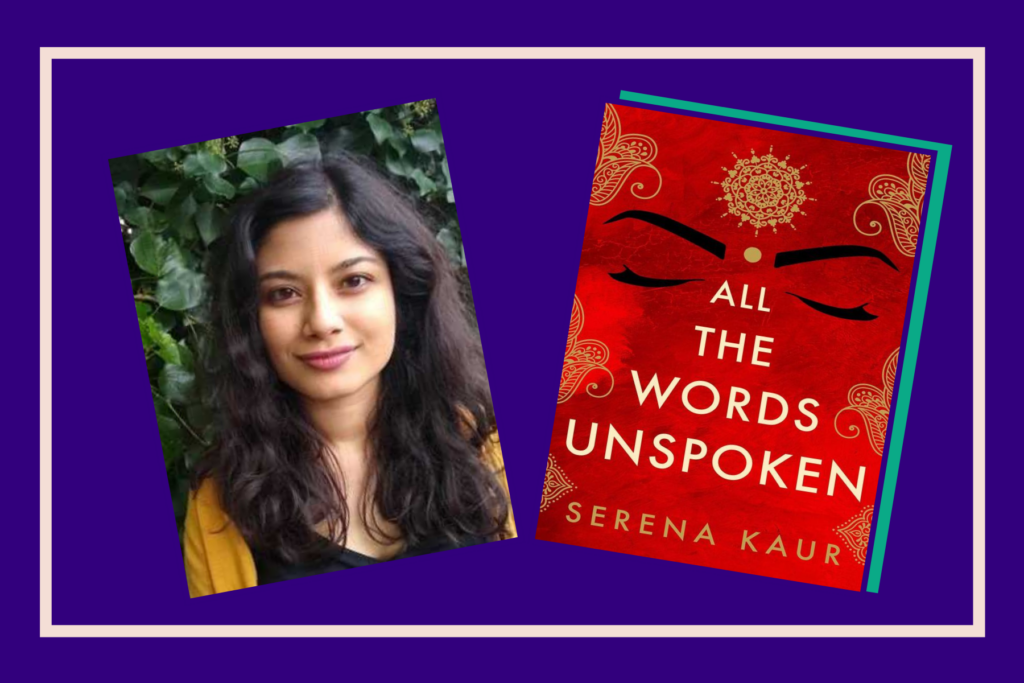A True South Asian Novel: Serena Kaur’s ‘All the Words Unspoken’ Tackles Modern Issues Realistically

Twenty-six-year-old Serena Kaur’s debut novel “All the Words Unspoken” is one of those books that cannot be put down. It’s a book you can read over and over again. It is a rare treat in how it directly reflects attitudes South Asians are so familiar with and comes from a place of understanding that fills a real gap in youthful, modern storytelling.
The story follows Maansi Cavale and Aryan Alekar, two young British- Asians from Leicester and London whose lives have been shaped (and arguably crushed) by expectations from parents and communities — and the lengths they are expected to go to conform, burying their true selves in the process. “Log kya kahenge?” is the dominant ideology (what will people say). As Maansi and Aryan’s lives entangle, the secrets and traumas they have spun unravel.
Both protagonists have had their minds and bodies forcibly put through the pain. Each could have said ‘no’ if they really wanted to and run away from community and family ties to live out the path they wanted. But they felt the weight of pressure, judgment and shame to consent to something they didn’t believe in, with damaging consequences.
[Read Related: Editor’s Picks: 6 Must-Have Books to Read this Holiday Season]
We see them try to pick up the pieces and confront everything they’ve been through — sacrifice, family interference and tough choices. It is both a glossy, easy read that sweeps you along and also a violent, incredibly difficult read of undeniable home truths.
It is many things — an unexpected love story, an affecting coming-of-age journey, and a call for change on the limits of South Asian culture. Whilst we join our hero and heroine on their quests to find and live their truest selves, they cannot be entirely free of their culture; neither to give up attitudes they grew up with nor the families they are so interconnected in. There can be no real “going it alone” if you don’t wish to give up your community. Kaur’s strength is how she understands and works this into the story — a true South Asian novel tackling modern issues realistically.
The exciting, relatable story is excellently plotted and comes together almost seamlessly at its climax — impressive for a first novel. Surprisingly amusing yet dark, with clever twists, it reminds one of Balli Kaur Jaswal’s “The Unlikely Adventures of the Shergill Sisters” (2019) and “Erotic Stories for Punjabi Widows” (2017). All are honest depictions of British- Asian life, with unsettling sorrow beneath the surface of community pressure and inevitable lies and betrayals — what lurks is violence, danger and both physical and emotional pain.
At times though, I wanted a break from the clichéd view of restrictive, conservative South Asian culture. The novel confronts taboos of mental health, abortion and domestic abuse while raising important questions on arranged marriage, gender roles, homophobia, sexuality and forced conversion therapy. These are very real, present issues but a lot to cover in just 200 pages. It sometimes seemed overwhelming, especially within such a fast-paced, lighthearted love story.
Some of these heavy topics perhaps needed more space, time and focus to grasp nuanced impacts on characters and their worlds, so as not to appear like a list of practically every problem known to the South Asian community. Exploring just one theme would have made an equally compelling read.
Nevertheless, what we’re presented with is entirely realistic — nothing felt contrived or unlikely. Most of us have encountered similar views or experiences. While there can be no clear takeaways as our characters’ views constantly evolve and hypocrisy is rife, this is another success of Kaur’s novel; to partially lift the veil from a seemingly fun, glittery, unconventional love story and offer glimpses into the ugly underside.
These conversations cannot be resolved rationally because they are not conversations that happen in South Asian communities. As they are pushed further to one side in the name of reputation, they become shameful, unspeakable subjects that cannot stand up to reason. I’d be intrigued to see how Kaur approaches and refines these issues in the future.
[Read Related: Jini Reddy’s ‘Wanderland’: a Literary Journey Through Nature]
All in all, Kaur left my head spinning and foggy, in a good way. I was consumed in thinking about Maansi and Aryan; pondering the questions they raised whenever I happened to put the book down (which was rare) and continued to for days after. For a debut novelist to have such an impact is a huge achievement and will serve as an excellent conversation starter for many.
Kaur’s work unsettled me and got under my skin. I can’t wait to read what comes next and watch how her work develops.




